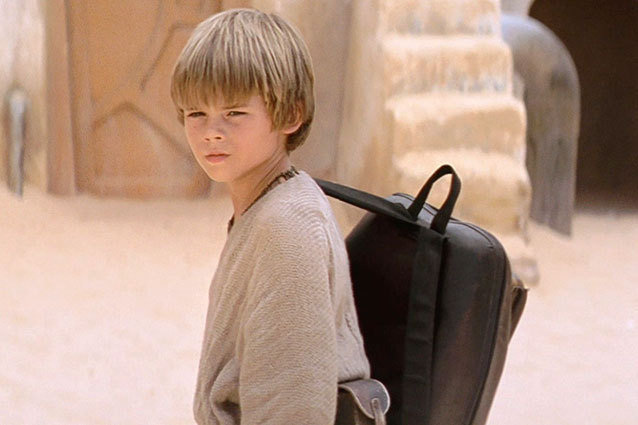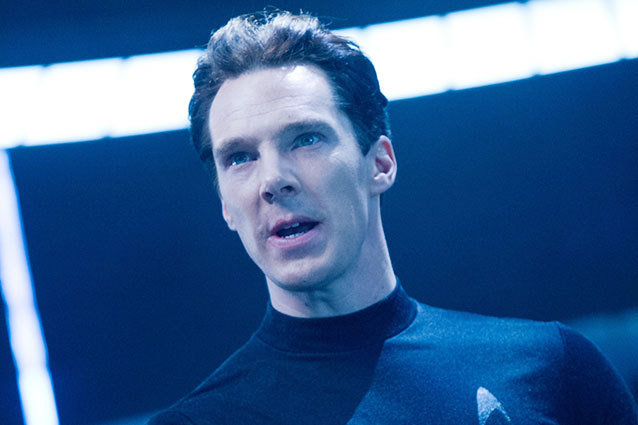
That’s the thing… Into Darkness has all these little Easter Eggs and references to Trek of old — shout-outs include a Tribble, the Enterprise NX-01 from Star Trek: Enterprise, Nurse Chapel — but it’s missing Trek’s soul. J.J. Abrams has assimilated the franchise into something worse than the Borg Collective: into the dispiriting monochromatic, shaky-cam, eardrum-shattering tropes of contemporary blockbuster filmmaking. This is a movie made by someone who, deep down, despises Star Trek. It might as well be called, as Matt Zoller Seitz put it in The Chicago Sun-Times, The Bourne Federation.
I’m a huge Star Wars fan too, and what I’m feeling, as a Trekker, about Into Darkness, is I think what many Star Wars fans felt about the prequels. The Phantom Menace, Attack of the Clones, and Revenge of the Sith, have inspired such blind rage from the fans, that it seems almost ridiculous. Personally, I think there are some good elements about those movies, and some bad ones too. They’re different from the Original Trilogy, sure, but, visually at least, they still feel like Star Wars movies. A lot of fans would disagree, though. And what they felt about those movies, I feel toward Star Trek Into Darkness. My depression over this film is only amplified by the fact that it’s gotten otherwise great reviews from the critics and will make a boatload of money, meaning that this is what people from now on will think Star Trek should be. Unlike the Star Wars prequels, which didn’t even necessarily rule out the opportunity for more Star Wars in the future, Star Trek Into Darkness could truly destroy Trek for me, if the franchise’s subsequent producers think that they have to make follow-ups in a similar vein.
MAJOR SPOILERS FROM HERE ON OUT
These are the four main reasons I hate Star Trek Into Darkness with such a passion.
1. Kirk’s Death — So Abrams and writers Roberto Orci, Alex Kurtzman, and Damon Lindelof decided just to restage Spock’s iconic death in The Wrath of Khan with the roles reversed! Except there are no stakes here. Ever. You know McCoy will find some way to bring Kirk back from the dead in 10 minutes. And he does. At least when Spock died, it took a whole movie, the death of Kirk’s son, the destruction of the Enterprise, and pretty much a journey to hell and back — with the Genesis Planet providing the hellfire — in order to bring Spock back to the living. Stakes! But the bigger problem is, why would you make a $190 million movie that pivots on recreating a scene from another film from 30 years ago? Doesn’t that make you stop and think, "Gee, maybe we should be watching The Wrath of Khan now, instead?"
With Kirk lethally irradiated and pressing his hand up against Spock’s on the other side of a pane of glass — and Spock then shouting "KHAAAAAAN!!!" after Kirk dies — Abrams & Co. make their objective with this movie clear. They’re only interested in regurgitating, then futzing with, the franchise’s mythology. They have no desire to create anything new, not an original villain, not an original scenario. They just want to take old leftovers, reheat and repackage them, and pass them off as something "new." This movie is equivalent of the food that's dispensed by Trek’s 24th century replicators: you think you’re eating a real meal, but it’s just flavorless, protein-re-sequenced gunk downloaded from a hard-drive. Kirk’s meaningless death and the way it’s staged like Spock’s from The Wrath of Khan shows that Star Trek is no longer about looking forward as Roddenberry intended, it’s about looking backward: nostalgia in place of optimism.

Paramount Pictures
2. Khan — Why did Benedict Cumberbatch’s John Harrison have to be Khan Noonien Singh? Can anyone answer that for me? Because he didn’t have
to be! He could have just been John Harrison, a Section 31 agent who
turned on the Federation after discovering Admiral Marcus' treachery. Or
someone who symbolized the soldiers-vs.-explorers debate at the heart
of Starfleet. But he had to be Khan. Which is so weird, because for a movie that includes so many references and callbacks to previous Trek,
Cumberbatch's Khan has almost nothing in common with the Khan we
already knew, aside from his ability to throw a good punch. Suddenly
he's a starship designer? And only a year after having been wakened from
cryosleep aboard the Botany Bay? What happened to how he
thinks in two-dimensional terms, like other 20th century Earth men? He
has a deep baritone, he thinks nine steps ahead of his adversaries, but
he has almost nothing in common with Ricardo Montalban’s Khan. John
Harrison could have been any character! The fact that he’s Khan is
totally arbitrary and an obvious ploy by Abrams and his lackeys to make
this movie more 'cool.'But here’s the deal: Khan is not a character like The Joker, who is strong enough to exist on his own terms regardless of who's playing him. You can recast The Joker. You can't recast Khan. Khan is and will forever be Ricardo Montalban. He is that character, amazingly ripped pecs and all.
There’s only one way they could have truly justified recasting Khan: actually having an Indian actor play the character. Khan is a Sikh from Northern India, and Montalban was a great Mexican actor — but there was always that ethnic disconnect. Why didn't Abrams cast his old Lost buddy Naveen Andrews in the role? That would make sense! Except that Abrams & Co. must have been so committed to the idea of playing it coy about Khan that they must have figured casting an Indian actor would give him away as the villain. So they went in the opposite direction. At least the Star Trek of old had an actor of color playing Khan, because now he's been whitewashed into oblivion. Cumberbatch is a great actor and he does the most that he can with the character, but there is no justification for why a Sikh Indian has now become the pastiest Englishman alive. Even him being played by a Mexican with a "rich Corinthian leather" accent made better sense.
How do we account for this whitewashing in the film itself? Did Khan at some point have genetic resequencing a la Gustav Graves in Die Another Day and choose to become a pasty Englishman? Did Marcus involuntarily subject him to that? There’s no good reason, whatsoever, for this sudden racial switch. I mean, Ang Lee must be kicking himself for not thinking of making Life of Pi an all-white affair with Freddie Highmore as its lead. Damn, and if only Slumdog Millionaire had been made with Josh Hutcherson in place of Dev Patel and Stanley Tucci in place of Anil Kapoor. Why stop there? Because Abrams obviously also wanted to s**t on one of the greatest roles ever played by a Latino actor. So why don’t we remake West Side Story with an all-white cast? And I can't wait to see Chris Hemsworth play Zorro!
3. Leonard Nimoy’s Cameo — Quinto's Spock calls Nimoy's Spock Prime to ask who the heck this Khan is, and the old guy says that he's "the most dangerous adversary the Enterprise ever faced." Meaning that Spock Prime just broke the Prime Directive and threatened altering the timeline again by helping his younger self. It's another example of how Star Trek Into Darkness is saying that the Prime Directive is meaningless, that it's a rule that's meant to be broken. And it's symbolic of Abrams' disregard for all of the Federation's — and, by extension, Star Trek's — values. Considering that it also references Montalban's original Khan, it makes you wonder: are we supposed to think he's been replaced by Benedict Cumberbatch in The Wrath of Khan as well? Has that movie been retroactively whitewashed too? And, again, why are we watching Star Trek Into Darkness when we could be watching that movie?
4. Characters Made of Cardboard — Other than the exploratory spirit, which was dead on arrival in Star Trek Into Darkness, the thing that always defined the franchise was its attention to its characters. They were such complex individuals, with uncertainties, doubts, strengths, and weaknesses. But in Star Trek Into Darkness they’re all just reduced to one defining characteristic. Kirk is a rule-breaking badboy; Spock isn’t just unfeeling, he’s uncaring; McCoy is a one-joke quote machine; Chekov is really young and inexperienced and has trouble pronouncing his "v’s"; Sulu’s steady and assured enough that he could one day take command; Scotty’s a party animal in a leisure suit; Uhura’s a shrill, nagging girlfriend. That last one is most dispiriting, because Nichelle Nichols’ Uhura was defined by her competence at her job, by the fact that she was the communications officer of the Federation’s flagship. Zoe Saldana’s Uhura is defined by her relationship to Spock. A franchise that even in the chauvinistic '60s used to shatter the Bechdel test all the time in its depiction of Uhura now fails to meet it in this film made four decades later. How is this progress?
For me, Abrams’ Star Trek Into Darkness even retroactively ruins his 2009 film, which I loved. Because it shows that this entire reboot project is just the Muppet Babies’ version of Star Trek, with the galaxy as its playpen and all the characters and plot points I knew and loved now reduced to toys that are brought out of the toybox to be recycled then discarded at whim. We’ve boldly gone nowhere.
No comments:
Post a Comment